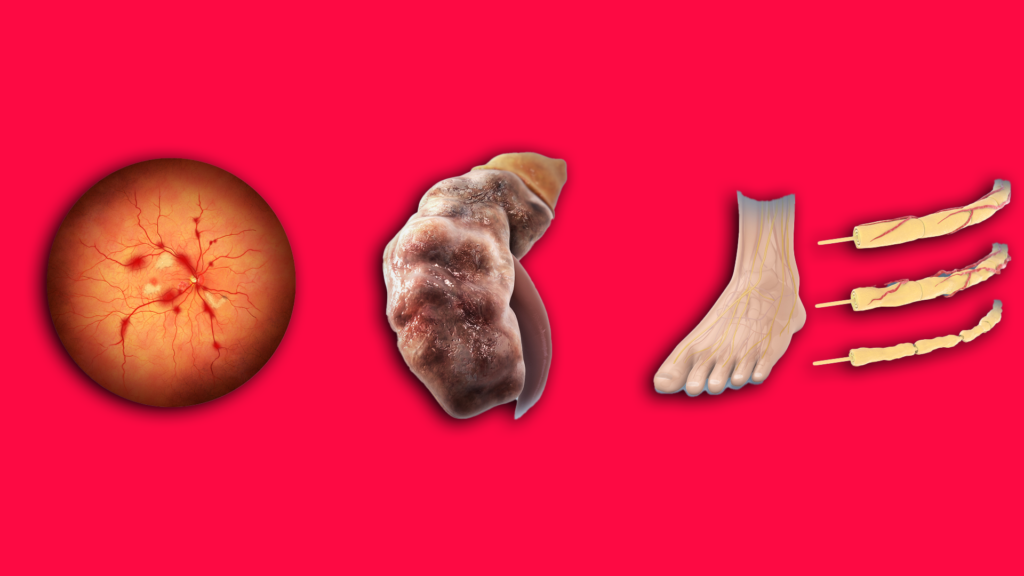Diabetes is a chronic and common condition in which blood glucose BG (sugar) level is increased. It can be controlled with diet, exercise, medications or insulin depending on the type of diabetes. Untreated, high BG may damage nerves either directly or because the blood supply to the nerves is reduced as a result of diabetes-related damage to the blood vessels that nourish nerve cells. Normal nerves carry signals between the brain and our body. Damaged nerves send or receive messages slowly or at the wrong times and eventually stop sending or receiving messages from/ to the brain. Damage to nerves is called neuropathy.
Three types of nerves can be affected by diabetic neuropathy:
- Sensory nerves (Help one feel touch, pain, temperature & other sensations)
- Motor nerves (Help control muscle movement & tome)
- Autonomic nerves (Help control involuntary functions such as digestion, sweating etc)
The nerve damage from diabetes most commonly involves peripheral nerves (they carry motor and sensory nerve fibers). Because multiple (usually on both sides of the body) peripheral nerves are affected, this is called, Diabetic sensorimotor Polyneuropathy. Less common types of diabetic neuropathy include mononeuropathy (single nerve damage), autonomic neuropathy & a dramatic but rare type of neuropathy called diabetic polyradiculopathy (or proximal neuropathy).
Diabetic sensorimotor polyneuropathy (DSPN or just DPN) is the most common form of diabetic neuropathy and may affect upto 50% of diabetic patients at some point. It affects the feet and legs first, followed by the hands and arms. You may experience one or more symptoms. Typically sensory symptoms precede motor symptoms and may include numbness/tingling and/or pain, often worse at night. With time, neuropathy results in weakness of muscles of the feet leading to changes in foot shape and geometry. These changes may make one prone to the formation of calluses and ulcers. Because a patient with neuropathy may not feel an injury or unusual pressure distribution, these deformities are not noticed until late. In addition, many such patients have poor circulation and/or compromised immune systems as a result of poor blood glucose control and the concomitant presence of other risk factors such as smoking, uncontrolled high blood pressure, high cholesterol or triglycerides and obesity. The presence of multiple risk factors increases the odds of poor healing and ultimately amputation may be needed.
The second most common type of neuropathy in diabetic patients is autonomic neuropathy. The autonomic system controls the function of many vital organs (automatically – without our conscious control). Sweat glands, digestive system, cardiovascular system and genitourinary systems are under autonomic system control. Therefore this kind of neuropathy may result in constipation, diarrhea, nausea/early satiety ( also called gastroparesis), dry skin or profuse sweating, postural lightheadedness & reduced ability to detect symptoms of low blood glucose (hypoglycemia).
Rare forms of diabetic neuropathy include proximal neuropathy ( also called diabetic amyotrophy) which is seen in older patients with well-controlled diabetes who developed sudden onset of weakness and pain involving the hips, buttocks or thighs. It usually affects one side and although it’s dramatic at the onset, the patients tend to recover gradually.
Similar onset and spontaneous recovery is noted in another form of neuropathy called focal neuropathy. As the name indicates, these patients develop sudden and often painful weakness involving one nerve or group of closely located nerves. These tend to recover spontaneously as well. Symptoms may include double vision, facial weakness (Bell’s palsy), one-sided pain in the trunk or lower extremities.
Diagnosis:
Your doctor may determine that you have neuropathy based on your medical history for a careful examination (particularly of your feet). At least once a year, you should have a careful examination by your doctor. This examination may involve checking for loss of sensation with the use of a nylon fibre (monofilament testing), checking vibratory senses with the use of a tuning fork or by taking your ankle reflex. Sometimes your doctor may refer you for specialized testing such as a nerve conduction test.
Treatment:
Unless detected very early, diabetic neuropathy cannot be cured but its progression can be slowed and complications can be avoided by taking certain steps. The best strategy is to prevent neuropathy from occurring by meticulously controlling glucose readings, reducing weight, controlling blood pressure and lipids and giving up smoking. Other important preventive measures include wearing well-fitted shoes, not walking barefoot, inspecting her feet every day (including using a mirror to look at the bottom of her feet) and keeping her feet clean and dry. He should be especially careful when trimming your toenails. At your toenails straight across and file the ages carefully and gently.
If diabetic neuropathy does occur, improving metabolic control (controlling blood glucose and lipids) and a healthy lifestyle (quitting smoking, reducing caloric intake and exercising) may help slow the progression of the neuropathy or the development of complications such as foot ulcers and amputations. If deformities are present, the risk of amputation increases significantly. In such cases, coordinated care provided between your primary care physician, endocrinologists, podiatrist and wound care specialist may be necessary and is often recommended.
Medications:
Diabetic neuropathy pain may respond to certain prescription medications but these medications may not work for everybody. Your doctor may initially prescribe, and over-the-counter pain medications such as acetaminophen ( Tylenol) or ibuprofen ( Motrin) etc. Sometimes your doctor may have to try other prescription medicines. These medications include:
- Anti-Seizure medicines: some anti-seizure medicines are effective in controlling and reducing nerve pain. Lyrica or gabapentin are commonly used. Side effects may include drowsiness and dizziness. The side effects may diminish with time. Lyrica may cause weight gain.
- Antidepressant medications: Some antidepressant medications may help reduce nerve pain, even if you are not depressed. These may include amitriptyline, duloxetine or Cymbalta, venlafaxine or Effexor etc. Side effects may include drowsiness, dizziness, nausea or constipation.
Because these medications are not uniformly effective and sometimes the side effects are too bothersome for the patients, your physician may try other modalities such as topical anaesthetic patch ( lidocaine), TENs Units (which provide low-grade electrical current to help reduce neuropathic pain), complementary therapy ( for example acupuncture)and in some cases nerve block or epidural steroid injections. For other symptoms of neuropathy, specific treatments may be tried, such as metoclopramide for gastroparesis. Narcotic analgesics should only be used as a last resort. These can be addictive, gradually less effective and quite often associated with side effects such as nausea and constipation.
Living with diabetic neuropathy can be difficult and frustrating. Many patients develop depression. If you develop such feelings, please talk to your doctor or seek help from a licensed counsellor or therapist. We hope that ongoing research will lead to the development and availability of safer and more effective medications and therapies for our patients with diabetes and neuropathy.
This information is for general knowledge & is not a substitute for medical advice your doctor recommends
Post Disclaimer
We are not your healthcare provider, and your use of this website does not establish a patient-client relationship. All the information contained on this website is for informational purposes only. No material on this site is intended to be a substitute for professional medical advice (diagnosis, treatment, testing or nutritional information). Always seek the advice of your physician or qualified healthcare provider with any questions you may have regarding medical or health-related conditions or treatment. Your healthcare provider knows your condition or situation well and can give you specific advice which would be appropriate for your condition/situation. Your healthcare provider can also guide you more accurately about injection techniques, dietary interventions and the use of medical technology that is most pertinent and suitable for you. Please do not disregard professional medical advice or delay in seeking it because of something you may have read on this website.

